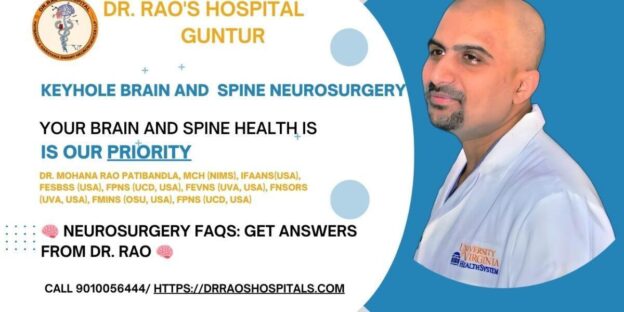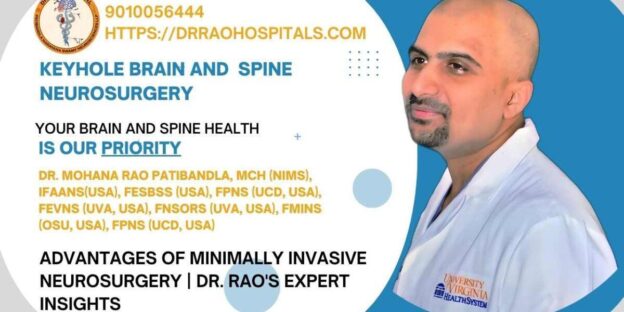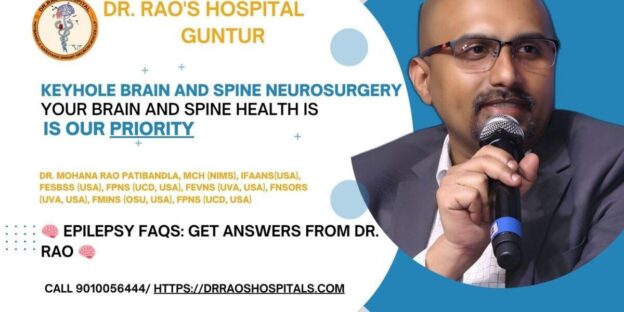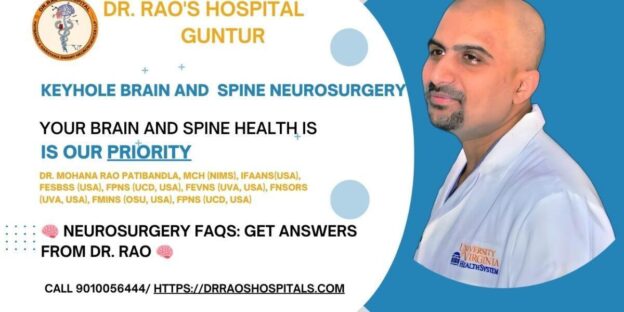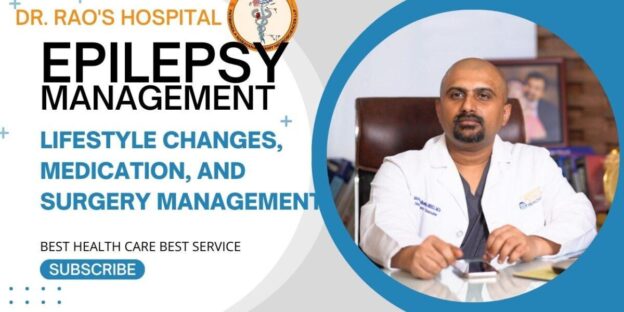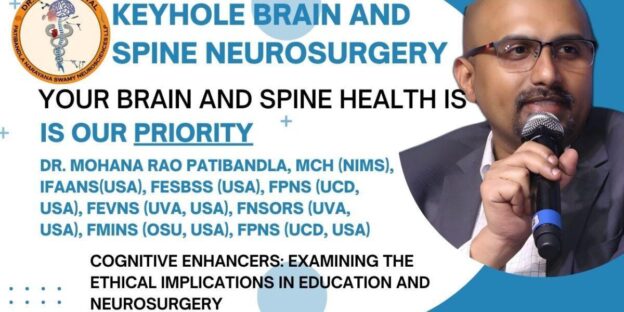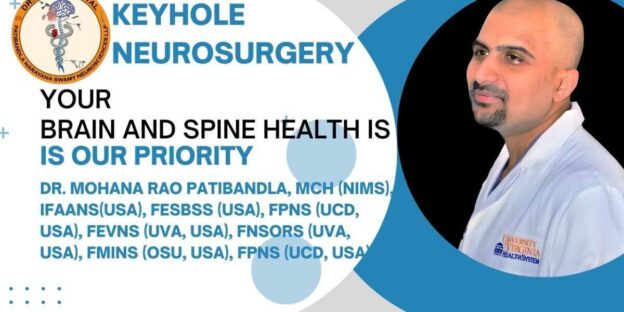Neurological Disorders Types – Neurosurgery Care at Dr Rao’s Hospital
Introduction
Neurological disorders affect the intricate network of the nervous system, causing a wide range of symptoms and challenges for those affected. In this blog, we delve into the diverse types of neurological disorders, and shed light on the remarkable expertise of Dr. Rao, a leading neurosurgeon in Guntur and India. We will also explore Dr. Rao’s hospital, a renowned institution for neurosurgery in Guntur and India.
Understanding Neurological Disorders: The human nervous system is a complex web of cells, nerves, and tissues that control our thoughts, movements, and bodily functions. Neurological disorders arise when there are abnormalities or damages to this intricate system. These disorders can manifest in various ways, impacting cognition, motor skills, sensations, and even autonomic functions.
Types of Neurological Disorders:
- A stroke occurs when the blood supply to the brain is disrupted, leading to brain cell damage. It often results in paralysis, speech difficulties, or cognitive impairments.
- Epilepsy: Epilepsy is characterized by recurrent seizures caused by abnormal electrical activity in the brain. These seizures can vary in frequency and intensity.
- Multiple Sclerosis (MS): MS is an autoimmune disease that affects the central nervous system, causing symptoms such as fatigue, numbness, and impaired coordination.
- Parkinson’s Disease: Parkinson’s is a progressive disorder that affects movement due to a lack of dopamine production in the brain. It commonly leads to tremors, stiffness, and difficulties with balance.
- Alzheimer’s Disease: Alzheimer’s is a neurodegenerative disorder characterized by memory loss, cognitive decline, and changes in behavior. It is the most common form of dementia.
- Migraines: Migraines are severe headaches accompanied by visual disturbances, nausea, and sensitivity to light or sound. They can significantly impact a person’s quality of life.
- Amyotrophic Lateral Sclerosis (ALS): ALS, also known as Lou Gehrig’s disease, is a progressive neurodegenerative disorder that affects nerve cells responsible for controlling voluntary muscle movements. It leads to muscle weakness, difficulty speaking and swallowing, and eventual paralysis.
- Traumatic Brain Injury (TBI): TBI occurs when a sudden impact or blow to the head causes damage to the brain. It can result in various cognitive, sensory, and motor impairments, depending on the severity of the injury.
- Neuropathy: Neuropathy refers to damage or dysfunction of the nerves outside the brain and spinal cord. It can cause symptoms such as tingling, numbness, muscle weakness, and pain, often in the hands and feet.
- Cerebral Palsy: Cerebral palsy is a group of disorders that affect movement, muscle tone, and posture. It occurs due to damage or abnormalities in the developing brain, often before or during birth. Individuals with cerebral palsy may struggle with coordination, balance, and fine motor skills.
- Huntington’s Disease: Huntington’s disease is an inherited genetic disorder that causes the progressive breakdown of nerve cells in the brain. It leads to involuntary movements, cognitive decline, and behavioral changes.
- Brain Tumors: Neurosurgeons play a crucial role in diagnosing and treating brain tumors. Whether benign or malignant, these abnormal brain growth may require surgical intervention for removal or biopsy.
- Spinal Disorders: Neurosurgeons are skilled in treating spinal disorders such as herniated discs, spinal stenosis, and spinal deformities like scoliosis. Surgical procedures, such as spinal fusion or discectomy, may be performed to alleviate pain, stabilize the spine, or restore function.
- Hydrocephalus: This condition involves the accumulation of cerebrospinal fluid (CSF) in the brain, leading to increased pressure and potential brain damage. Neurosurgeons often employ surgical procedures, such as shunting, to divert excess CSF and relieve pressure.
- Chiari Malformation: Chiari malformation is a structural defect in which brain tissue extends into the spinal canal. Neurosurgical interventions, such as decompression surgery, may be performed to alleviate symptoms and restore normal cerebrospinal fluid flow.
- Trigeminal Neuralgia: This condition is characterized by severe facial pain, often caused by irritation or compression of the trigeminal nerve. Neurosurgeons can perform microvascular decompression or stereotactic radiosurgery to alleviate pain and improve quality of life.
- Aneurysms and Arteriovenous Malformations (AVMs): Neurosurgeons play a vital role in treating cerebral aneurysms and AVMs. Surgical techniques, such as clipping or endovascular coiling, may be utilized to prevent rupture or manage existing bleeding.
- Cranial Nerve Disorders: Neurosurgeons may treat various disorders affecting the cranial nerves, such as trigeminal neuralgia (mentioned earlier), facial nerve disorders, and vestibular schwannomas (also known as acoustic neuromas) that affect the vestibulocochlear nerve.
- Moyamoya Disease: This rare cerebrovascular disorder is characterized by the narrowing or blockage of the arteries at the base of the brain, leading to reduced blood flow. Neurosurgical procedures, such as direct or indirect bypass surgeries, are performed to restore blood flow and prevent stroke.
- Skull Base Tumors: Neurosurgeons specialize in treating tumors located at the base of the skull, including pituitary adenomas, meningiomas, and chordomas. Surgical approaches, such as endoscopic endonasal surgery or craniotomy, may be employed to remove these tumors safely.
- Epilepsy Surgery: In cases where medication fails to control seizures adequately, neurosurgeons can perform epilepsy surgery to remove or disconnect the specific brain areas causing seizures. These procedures aim to reduce seizure frequency or achieve seizure freedom in specific individuals.
- Cerebrovascular Malformations: Neurosurgeons treat various cerebrovascular malformations, including arteriovenous malformations (AVMs), cavernous malformations, and dural arteriovenous fistulas. Treatment options may include microsurgical resection, embolization, or radiosurgery.
- Lumbar Disc Herniation: Neurosurgeons often treat lumbar disc herniation, which occurs when the soft cushioning discs between the vertebrae in the lower back rupture or bulge. Surgical interventions like microdiscectomy or laminectomy may be performed to relieve pressure on the spinal nerves and alleviate pain.
- Spinal Cord Tumors: Neurosurgeons specialize in diagnosing and treating tumors that affect the spinal cord. Surgical procedures, such as tumor resection or spinal stabilization, are performed to remove or reduce the tumor’s impact on spinal cord function.
- Hydrocephalus: In addition to the earlier mention, neurosurgeons commonly treat hydrocephalus, a condition characterized by the buildup of cerebrospinal fluid within the brain. Shunt placement or endoscopic third ventriculostomy (ETV) are standard neurosurgical procedures for managing hydrocephalus.
- Degenerative Spine Conditions: Neurosurgeons frequently address degenerative spine conditions like spinal stenosis, degenerative disc disease, and spondylolisthesis. Surgical interventions, such as spinal fusion, laminectomy, or artificial disc replacement, may be performed to alleviate symptoms and stabilize the spine.
- Traumatic Brain Injuries (TBIs): Neurosurgeons are at the forefront of managing traumatic brain injuries, ranging from mild concussions to severe head trauma. They may perform surgeries to remove blood clots, repair skull fractures, or alleviate intracranial pressure caused by swelling.
- Peripheral Nerve Surgery: Neurosurgeons also specialize in treating peripheral nerve conditions, including carpal tunnel syndrome, ulnar nerve entrapment, and peripheral nerve tumors. Surgical procedures like nerve decompression, transposition, or tumor excision may be performed to relieve nerve compression or address nerve-related issues.
- Epidural Hematoma: An epidural hematoma occurs when bleeding between the skull and the protective covering of the brain (dura). Neurosurgeons often perform emergency surgical interventions to remove the clot and relieve pressure on the brain.
- Subarachnoid Hemorrhage: Subarachnoid hemorrhage refers to bleeding in the space between the brain and the thin tissues that cover it. Neurosurgeons are involved in diagnosing and treating this emergency condition, often requiring urgent surgical intervention to control bleeding and prevent complications.
- Brainstem Herniation: Brainstem herniation occurs when increased pressure within the skull causes the brain to shift and compress the brainstem. This life-threatening emergency necessitates immediate neurosurgical intervention to relieve pressure and prevent damage to vital brain structures.
- Neurological Trauma: Neurosurgeons frequently respond to emergencies involving severe head trauma, spinal cord injuries, or injuries to the peripheral nerves. They provide timely and specialized surgical interventions to stabilize the patient, alleviate pressure, and prevent secondary injuries.
- Intracranial Infections: Neurosurgeons manage emergencies related to intracranial infections, such as meningitis or brain abscesses. Surgical interventions, such as abscess drainage or ventriculostomy, may be necessary to treat the infection and prevent its spread.
- Acute Hydrocephalus: Acute hydrocephalus can occur when there is a sudden blockage or disruption of cerebrospinal fluid flow. Neurosurgeons often perform emergency procedures, such as shunt revision or endoscopic third ventriculostomy (ETV), to relieve pressure and restore average CSF circulation.
Dr. Rao: The Best Neurosurgeon in Guntur and India
Dr. Rao is widely recognized as one of the foremost neurosurgeons in Guntur and India. With extensive experience and expertise, Dr. Rao has dedicated his career to providing exceptional care to patients with complex neurological conditions. His passion for neurosurgery and commitment to staying updated with the latest advancements have earned him a stellar reputation among peers and patients alike.
Dr. Rao’s Hospital: The Premier Neurosurgery Facility
Dr. Rao’s hospital is a leading institution for neurosurgery in Guntur and India. Equipped with state-of-the-art technology and a team of highly skilled professionals, the hospital provides comprehensive care for various neurological disorders. From diagnostic assessments to advanced surgical interventions and post-operative rehabilitation, Dr. Rao’s hospital offers a multidisciplinary approach to ensure the best possible outcomes for patients.
Conclusion
Neurological disorders encompass a broad spectrum of conditions, each with its unique impact on the nervous system and overall well-being. Dr. Rao, a distinguished neurosurgeon in Guntur and India, and his renowned hospital are at the forefront of providing expert care for patients with neurological disorders. Their dedication, expertise, and commitment to advancing neurosurgical treatments have made them invaluable assets to the medical community and sources of hope for countless individuals seeking neurological care.
#NeurologicalDisorders #Neurosurgery #DrRao #Guntur #India #BrainHealth #SpinalHealth #HealthcareHeroes #MedicalAdvancements #PatientCare


